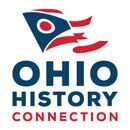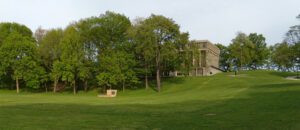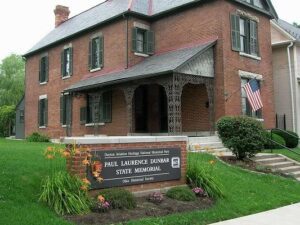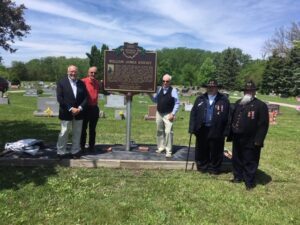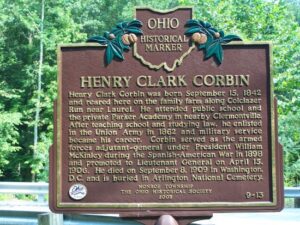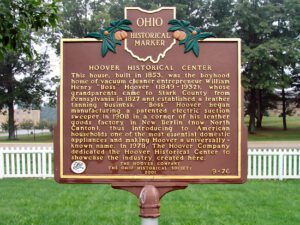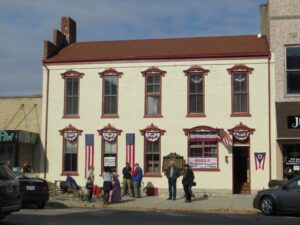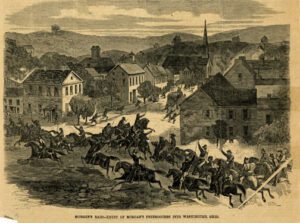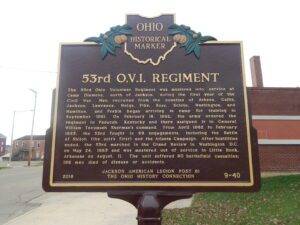, OH
In 1968, Richard Nixon won the presidency partly based on a campaign promise to end the Vietnam War. Though the war seemed to be winding down, on April 30, 1970, Nixon announced the invasion of Cambodia, triggering protests across college campuses. On Friday, May 1, an anti-war rally was held on the Commons at Kent State University. Protestors called for another rally to be held on Monday, May 4. Disturbances in downtown Kent that night caused city officials to ask Governor James Rhodes to send the Ohio National Guard to maintain order. Troops put on alert Saturday afternoon were called to campus Saturday evening after an ROTC building was set on fire. Sunday morning in a press conference that was also broadcast to the troops on campus, Rhodes vowed to “eradicate the problem” of protests at Kent State. (Continued on other side)
, OH
The first African-American to achieve prominence as a poet, Paul Laurence Dunbar was born and raised in Dayton, the son of former slaves. Working as an elevator operator while he established himself as a writer, Dunbar published his first book of poems, Oak and Ivy, in 1893. His third collection, Lyrics of a Lowly Life (1896) with an introduction by another Ohio-born author William Dean Howells, gained Dunbar widespread critical acclaim and popular recognition. Widely published in contemporary journals and literary magazines, Dunbar employed both turn-of-the-century African-American dialect and standard English verse to give a voice to the themes of everyday discrimination and struggles for racial equality. Tuberculosis cut his life short at age 33. Dunbar’s body of work includes twelve volumes of poetry, four books of short stories, a play, and five novels.
, OH
William J. Knight (1837-1916) was born in Wayne County, Ohio and raised by his grandparents, Jacob and Martha Knight, near Farmer, Ohio. After the outbreak of the Civil War, William enlisted in Company E, 21st Ohio Volunteer Infantry. On April 12, 1862, the twenty-five year-old Knight participated in “Andrews Raid” as an engineer. Led by James J. Andrews, the raiders stole the locomotive “General” at Big Shanty, Georgia, planning to cut telegraph lines and destroy railroad bridges and tracks as they headed north between Atlanta and Chattanooga. Above Ringgold, Georgia, the raiders were captured. Eight were executed. Knight and seven others escaped from an Atlanta jail on October 16, 1862 and made it to Federal lines. Six raiders were exchanged in 1863 (Continued on other side)
, OH
Henry Clark Corbin was born September 15, 1842 and reared here on the family farm along Colclazer Run near Laurel. He attended public school and the private Parker Academy in nearby Clermontville. After teaching school and studying law, he enlisted in the Union Army in 1862 and military service became his career. Corbin served as the armed forces adjutant-general under President William McKinley during the Spanish-American War in 1898 and promoted to Lieutenant General on April 15, 1906. He died on September 8, 1909 in Washington, D.C. and is buried in Arlington National Cemetery.
, OH
This house, built in 1853, was the boyhood home of vacuum cleaner entrepreneur William Henry “Boss” Hoover (1849-1932), whose grandparents came to Stark County from Pennsylvania in 1827 and established a leather tanning business. “Boss” Hoover began manufacturing a patented electric suction sweeper in 1908 in a corner of his leather goods factory in New Berlin (now North Canton), thus introducing to American households one of the most essential domestic appliances and making Hoover a universally-known name. In 1978, The Hoover Company dedicated the Hoover Historical Center to showcase the industry created here.
, OH
This mid-19th-century structure, built in the Federal style with Italianate detail added later, was once owned by town pioneer and merchant Cornelius Van Ausdal. It was later the home of his daughter Lucinda, her husband Joseph Donohoe, and their four children. Presidential candidate William Henry Harrison reportedly stayed here while he was in Eaton to deliver a campaign speech on September 8, 1840. Lucinda Donohoe reputedly also hosted circuit-riding preachers here and owned the area’s first piano. From 1938 to 1966, this building housed Mrs. Wagner’s Colonial Kitchen, a nationally recognized restaurant.
, OH
General John Hunt Morgan led a force of 2,000 Confederate cavalrymen into Meigs County during a raid north of the Ohio River. More than 50,000 Union troops and mlitia had been in pursuit of Morgan across Ohio. Near this site on July 18, 1863, Holliday Hysell and Dr. William N. Hudson were shot and killed by Confederate soldiers. These were the only civilians killed in Meigs County during Morgan’s Raid. After suffering losses at Buffington Island, Morgan surrendered eight days later near West Point in Columbiana County. The surrender field was the northernmost point reached by Confederate forces during the Civil War.
, OH
The 53rd Ohio Volunteer Regiment was mustered into service at Camp Diamond, north of Jackson, during the first year of the Civil War. Men recruited from the counties of Athens, Gallia, Jackson, Lawrence, Meigs, Pike, Ross, Scioto, Washington, and Hamilton, and Preble began arriving in camp for training in September 1861. On February 16, 1862, the army ordered the regiment to Paducah, Kentucky and there assigned it to General William Tecumseh Sherman’s command. From April 1862 to February 1865, the 53rd fought in 69 engagements, including the Battle of Shiloh (the unit’s first) and the Atlanta Campaign. After hostilities ended, the 53rd marched in the Grand Review in Washington D.C. on May 24, 1865 and was mustered out of service in Little Rock, Arkansas on August 11. The unit suffered 80 battlefield casualties; 196 men died of disease or accidents.

